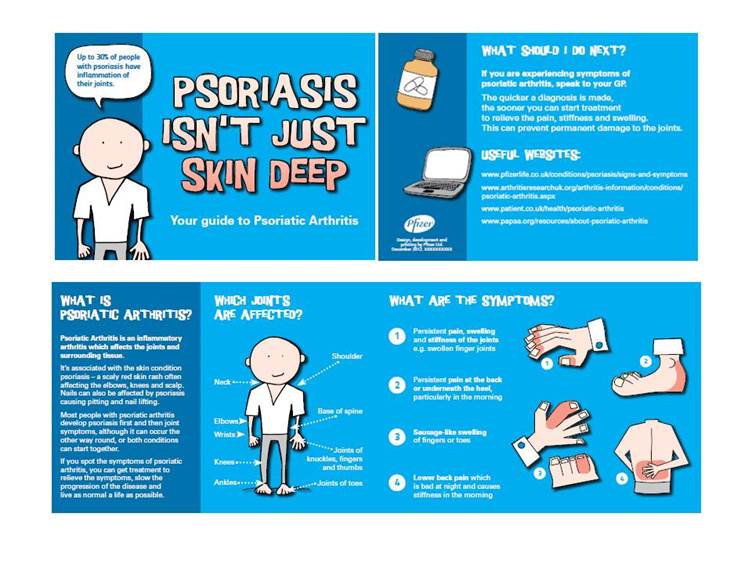Session Information
Date: Sunday, November 8, 2015
Session Type: ACR Poster Session A
Session Time: 9:00AM-11:00AM
Background/Purpose: There is a need for screening to
identify patients with psoriasis who have PsA. We developed an educational
leaflet about the risk of PsA to improve screening attendance. Our aim was to investigate
the prevalence of PsA in primary care and whether an educational leaflet can
improve attendance.
Methods: Patients with psoriasis were identified from
5 GP surgeries in Yorkshire and a random sample were invited to participate.
Patients had to be ≥18 years old, have a coded diagnosis of psoriasis and
no diagnosis of PsA, RA or AS. At each site, patients were randomised 1:1 to
receive study information alone or with the educational leaflet. Consenting
patients were then assessed by a dermatologist and rheumatologist. Diagnosis
of PsA was made by the assessing rheumatologist. To compare the response rate,
we assumed a difference of 20% (50% without leaflet, 70% with leaflet). With
an alpha=0.05 and beta 0.9, using a two sided test a minimum sample size of 248
was required. 191 attendees were required for assessment of screening
questionnaires.
Results: A total of 932 packs were sent out to
recruit 191 (20.5%) participants attending. Of these, 169 (88.5%) had current
or previous psoriasis. Using physician diagnosis 17 (10.1%) were found to have
previously undiagnosed PsA, 90 (53.3%) were found to have another musculoskeletal
complaint and 62 (36.7%) had no musculoskeletal problems. Using data from the
practices and correcting for misdiagnosis of psoriasis, the estimated
prevalence of PsA was 18.1%.
Overall the response rate was lower than predicted and was not
significantly higher when patients received the educational leaflet (22.8% vs
18.3%, p=0.08). Response rates varied by practice (14.7 to 30.6%). Socioeconomic
data of the registered patients at each practice provided national statistics
on deprivation with each practice given a decile score. In our study, one
practice had a deprivation score of 3 (third most deprived), one had a score of
7 and the rest had a score of 10 (least deprived decile). Analysing the impact
of the leaflet on response rates by deprivation showed that there was a
significant increase in response with the leaflet for deprivation decile of 3 (see
table, p<0.001) but no significant differences in the other practices.
Conclusion: The total prevalence of PsA within
patients with psoriasis in primary care is estimated at 18.1%, and from a
sample of 191, 10.1% are diagnosed with new PsA at screening. An educational
leaflet about PsA did not improve attendance for screening overall, but did
significantly improve attendance in practices with higher levels of
socioeconomic deprivation.
|
Deprivation Index |
Information given |
No of packs sent |
Response rate (%) |
Pearson Chi Squared |
P value |
|
3 |
Leaflet |
46 |
30.4 |
13.21 |
<0.001 |
|
|
No leaflet |
54 |
3.7 |
||
|
7 |
Leaflet |
75 |
18.7 |
1.92 |
0.166 |
|
|
No leaflet |
75 |
10.7 |
||
|
10 |
Leaflet |
340 |
22.6 |
0.18 |
0.894 |
|
|
No leaflet |
342 |
22.2 |
To cite this abstract in AMA style:
Coates LC, Savage LJ, Moverley AR, Helliwell PS. Does an Educational Leaflet Improve Attendance for Screening for Psoriatic Arthritis? [abstract]. Arthritis Rheumatol. 2015; 67 (suppl 10). https://acrabstracts.org/abstract/does-an-educational-leaflet-improve-attendance-for-screening-for-psoriatic-arthritis/. Accessed .« Back to 2015 ACR/ARHP Annual Meeting
ACR Meeting Abstracts - https://acrabstracts.org/abstract/does-an-educational-leaflet-improve-attendance-for-screening-for-psoriatic-arthritis/

